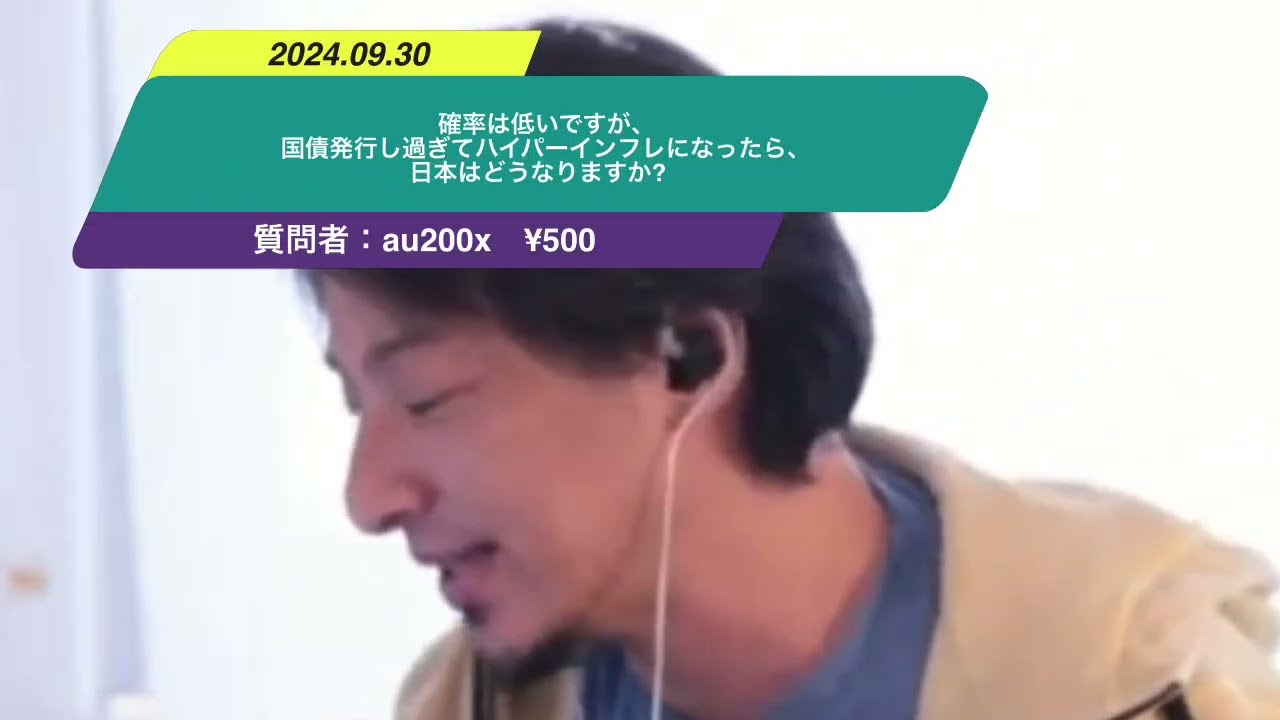質問者:au200x ¥500
確率は低いですが、もし某現代貨幣理論大好き政治家が政権を握り何かの間違いで国債発行し過ぎてハイパーインフレになったら、日本はどうなりますか? エネルギー自給率11%、食料自給率カロリーベース38%の日本が輸入かなり厳しくなったら停電しまくり&餓死者増加となりませんか?
元動画:2024年はあと3か月の巻。La Bleueを吞みながら。L19 2024/09/30
https://www.youtube.com/watch?v=MgzBHGufufw
(00:00)
え、確率は低いです。でも、もし現代貨幣理論が大好きな政治家が政権を握って、国債を発行しすぎてハイパーインフレになったら、日本はどうなりますか?エネルギー自給率11%、食糧自給率カロリーベース38%の日本がかなり厳しくなったりして、電力が不足し、電気代が急増するかもしれません。
まず、貨幣がめちゃめちゃハイパーインフレになった場合、例えば1万円の価値が1ヶ月後には1000円になるような状況だと、1万円をもらっても実質いくらになるかわからないということになります。つまり、その国の通貨で取引が行われなくなるんです。そうなると、ジンバブエドルのように、その国の通貨が流通せず、アメリカドルなどが使われるようになります。ウルグアイなどではインフレが進行しているため、ビットコインが使われることもあります。
なので、働いている人たちの支払いは基本的にドルベースになると思います。例えば、カップラーメンを150円で売っているメーカーがあったとしたら、それが1ドルで売られるようになるでしょう。円の価値は下がり続けるかもしれませんが、カップラーメンはドルで売られるようになります。労働者の給料もドルで支払われるようになるので、労働者はそこまで困らないと思います。
(01:02)
では、誰が困るかというと、年金受給者や生活保護受給者です。労働者はドルで給料をもらえる可能性がありますが、日本の法律では年金や生活保護は日本円で支給されることになっています。そのため、10万円をもらったとしても、実質的には1000円程度の価値しかなく、カップラーメン10個で1ヶ月をやりくりするような状況になります。
そうなると、生活保護受給者や年金受給者は家賃が払えなくなり、土地の価値が大暴落する可能性があり、治安も悪化するかもしれません。しかし、高齢者や生活保護受給者はエネルギーが強くないので、実質的には物資の支給などでカバーされることになるでしょう。
(02:08)
苦しい状況にはなりますが、政権はそれどころではなく、政府もほぼ機能していない状態になるでしょう。高齢者が騒いだとしても、選挙をやり直してもインフレを止められるわけではありません。高齢者や生活保護受給者、資産家の人々は苦しむことになります。資産家でもアメリカ株で暮らしている人や外貨を保有している人は比較的問題ありませんが、日本株や日本の不動産で収入を得ている人は困難に直面するでしょう。
不動産オーナーも円での収入が減少し、家賃の値上げをしようとしても、インフレが進みすぎてカップラーメン1個が1万円になるような状況では毎月家賃を変更することは日本の法律上不可能です。そのため、賃貸で借りている労働者は楽になるかもしれません。
(03:09)
日本の場合、大規模な犯罪や暴動は起きにくいでしょうが、弱者が苦しむ形で社会が変わるでしょう。経済の不安が続く中で、年金受給者が多くの資産を持っている状況が是正される可能性もあります。
暴動が起こったとしても、フランスのように店舗を破壊するような大規模な暴動は日本では起こりにくいと思います。70歳のおばあちゃんが暴れることはできないでしょう。日本は他の国よりも安全に崩壊するのではないかと思います。
(04:14)
一方で、無敵の人、すなわち若者で犯罪を犯しても罰にならないと感じる人たちは減るのではないかと思います。行きづらい世の中であっても、希望を見いだせる状況になるかもしれません。
[Hiroyuki] Although the probability is low, what would happen to Japan if excessive government bond issuance leads to hyperinflation? – Hiroyuki Clip 20240930 – YouTube
Transcription
(00:00)
The probability is low. But, if a politician who loves modern monetary theory were to take control and mistakenly issue too many government bonds, resulting in hyperinflation, what would happen to Japan? Japan has an energy self-sufficiency rate of 11% and a food self-sufficiency rate on a calorie basis of 38%, so things could get very difficult, and electricity shortages might lead to a significant increase in electricity costs.
First, if hyperinflation occurs, and for example, the value of 10,000 yen drops to 1,000 yen in a month, then even if someone receives 10,000 yen, they won’t know what its value will be. Basically, transactions won’t be conducted in that country’s currency anymore. This would result in something like the Zimbabwe dollar era, where the national currency stops being used and the U.S. dollar becomes the main currency. In places like Uruguay, where inflation is high, people might start using Bitcoin.
So, people’s salaries would be paid in dollars. If a company currently sells instant noodles for 150 yen, it would start selling them for 1 dollar. The yen’s value would continue to decline, but the price of instant noodles would be in dollars. I think workers would end up being paid in dollars, and although there would be some confusion initially, it wouldn’t be a problem for workers.
(01:02)
But who would be affected? Pensioners and welfare recipients. Workers might receive their salaries in dollars, but Japanese law requires pensions and welfare payments to be paid in yen. So, if someone receives 100,000 yen, it would essentially be worth 1,000 yen, meaning they’d have to survive on 10 cups of instant noodles for a month.
As a result, welfare recipients and pensioners might struggle to pay rent, and the value of land could plummet, leading to a decline in public safety. However, since elderly people and welfare recipients don’t have much influence, the government might resort to distributing physical goods to cover basic needs.
(02:08)
Although it would be a very tough situation, the government would have bigger problems to deal with and would hardly be functioning. Even if elderly people protested, holding elections or reshuffling the government wouldn’t stop the inflation. So, pensioners, welfare recipients, and even asset holders would suffer. However, those with assets in American stocks or foreign currencies wouldn’t be affected as much.
Landlords who rely on rental income in yen would also face difficulties. Even if they tried to increase the rent to match inflation, if inflation got to the point where one cup of instant noodles costs 10,000 yen, it would be impossible to adjust rent every month due to Japanese law. As a result, renters would have an easier time.
(03:09)
In Japan, large-scale crime or riots probably wouldn’t occur, but weaker people would suffer, and society would change. The economic instability could also lead to some correction of the current situation where pensioners hold a large share of Japan’s wealth.
Even if protests broke out, Japan would be different from France, where people smash storefronts. Elderly people in Japan wouldn’t be able to riot in the same way, so the country might collapse in a safer manner than other countries.
(04:14)
On the other hand, people I call the “invincible” types, young people who feel they have nothing to lose, might decrease. When society becomes tough and uncertain, some people may see hope. Even though life might feel hard and bleak, when hyperinflation hits and no one knows what will happen next, some might find excitement in that uncertainty.




コメント